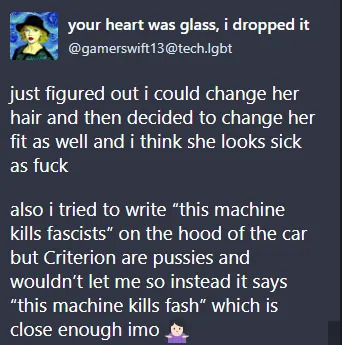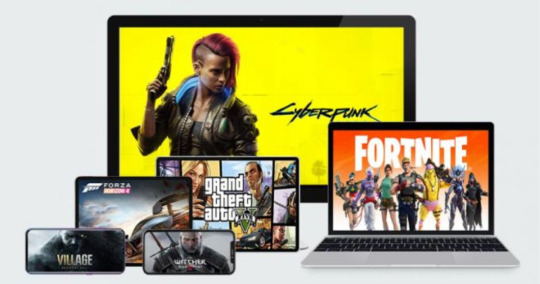#Cloud Gaming
Explore tagged Tumblr posts
Text
Time for our March giveaway... We're raffling off a Meta Quest 3S - which now officially supports both GeForce NOW and Xbox Cloud Gaming!
Enter at the link. Entries open until end of March.
317 notes
·
View notes
Text
When you enter build mode...
#fortnite#gaming#boosteroid#cloud gaming#fortnite art#fortnite item shop#fortnite battle royale#fortnite br#fortnite jonesy
3 notes
·
View notes
Text
Convicted monopolist prevented from re-offending

This Sunday (Apr 30) at 2PM, I’ll be at the San Francisco Public Library with my new book, Red Team Blues, hosted by Annalee Newitz.

In blocking Microsoft’s acquisition of Activision-Blizzard, the UK Competition and Markets Authority has made history: they have stepped in to prevent a notorious, convicted monopolist from seizing control over a nascent, important market (cloud gaming), ignoring the transparent, self-serving lies Microsoft told about the merger:
https://assets.publishing.service.gov.uk/media/644939aa529eda000c3b0525/Microsoft_Activision_Final_Report_.pdf
If you’d like an essay-formatted version of this post to read or share, here’s a link to it on pluralistic.net, my surveillance-free, ad-free, tracker-free blog:
https://pluralistic.net/2023/04/27/convicted-monopolist/#microsquish
Cloud gaming isn’t really a thing right now, but it might be. That was Microsoft’s bet, anyway, as it plonked down $69b to acquire Activision-Blizzard — a company that shouldn’t exist, having been formed out of a string of grossly anticompetitive mergers that were waved through.
Activision-Blizzard is a poster-child for the failures of antitrust law over the past 40 years, a period in which monopolies were tolerated and even encouraged by the agencies that were supposed to prevent monopolies from forming and break up the ones that slipped past their defenses. Activision-Blizzard is a giant, moribund company whose “innovation” consists of endless sequels to its endless sequels, whose market power allows it to crush its workers while starving competitors of market oxygen, ensuring that gamers and game workers have nowhere else to go.
Microsoft is another one of those poster-children, of course. After being convicted of antitrust violations, the company dragged out the legal process until George W Bush stole the presidency and decided not to pursue them any further, letting them wriggle off the hook.
The antitrust rough ride tamed Microsoft…for a while. The company did not use the same dirty tricks to destroy, say, Google as it had used against Netscape. But in the years since, Microsoft has demonstrated that it regrets nothing about its illegal conduct and has no hesitations about repeating that conduct.
This is especially true of cloud computing, where Microsoft is using exclusivity deals and illegal “tying” (forcing customers to use a product they don’t want in order to use a product they desire) to lock customers into its cloud offering:
https://www.reuters.com/technology/google-says-microsofts-cloud-practices-anti-competitive-slams-deals-with-rivals-2023-03-30/
Locking customers into Microsoft’s cloud also means locking customers into Microsoft surveillance. Microsoft’s cloud products spy in ways that are extreme even by the industry’s very low standards. Office 365 isn’t just a version of Office that you never stop paying for — it’s a version of Office that never stops spying on you, and selling the data to your competitors:
https://pluralistic.net/2020/11/25/the-peoples-amazon/#clippys-revenge
Microsoft’s Activision acquisition was entirely cloud-driven. The company clearly believes the pundits who say that the future of gaming is in the cloud: rather than playing on a device with the power to handle all the fancy graphics and physics, you’ll use a low-powered device that streams you video from a server in the cloud that’s doing all the heavy lifting.
If cloud gaming comes true (a big if, considering the dismal state of broadband, another sector that’s been enshittified and starved by monopolists), then Microsoft owning the Xbox platform, the Windows OS, and the Game Pass subscription service already poses a huge risk that the company could grow to dominate the sector. Throw in Activision-Blizzard and the future starts to look very grim indeed.
It’s a nakedly anticompetitive merger. As Mark Zuckerberg unwisely wrote in an internal memo, “it is better to buy than to compete.”
(These guys can not stop incriminating themselves. FTX got mocked for its group-chat called “Wirefraud,” but come on, every tech baron has a folder on their desktop called “mens rea” full of files with names like “premeditation-11.docx.”)
Naturally, the FTC sued to stop the merger (after 40 years, the FTC has undergone a revolution under chair Lina Khan and is actually protecting the American people from monopoly):
https://www.vice.com/en/article/ake97g/ftc-sues-to-block-microsoft-acquisition-of-call-of-duty-publisher-activision-blizzard
The FTC was always in for an uphill battle. “Cloud gaming,” the market it is seeking to defend from monopolization, doesn’t really exist yet, and enforcing US antitrust law against monopolies over existent things is hard enough, thanks to all those federal judges who attended luxury junkets where billionaire-friendly “economists” taught them that monopolies were “efficient”:
https://pluralistic.net/2021/08/13/post-bork-era/#manne-down
But the FTC isn’t the only cop on the beat. Antitrust is experiencing a global revival, from the EU to China, Canada to Australia, and South Korea to the UK, where the Competition and Markets Authority is kicking all kinds of arse (see also: “ass”). The CMA is arguably the most technically proficient competition regulator in the world, thanks to the Digital Markets Unit (DMU), a force of over 50 skilled engineers who produce intensely detailed, amazingly sharp reports on how tech monopolies work and what to do about them.
The CMA is very interested in cloud gaming. Late last year, they released a long, detailed report into the state of browser engines on mobile phones, seeking public comment on whether these should be regulated to encourage web-apps (which can be installed without going through an app store) and to pave the way for cloud gaming:
https://pluralistic.net/2022/12/13/kitbashed/#app-store-tax
The CMA is especially keen on collaboration with its overseas colleagues. Its annual conference welcome enforcers from all over the world, and its Digital Markets Unit is particularly important in these joint operations. You see, while Parliament appropriated funds to pay those 50+ engineers, it never passed the secondary legislation needed to grant the DMU any enforcement powers. But the DMU isn’t just sitting around waiting for Parliament to act — rather, it produces these incredible investigations and enforcement roadmaps, and releases them publicly.
This turns out to be very important in the EU, where the European Commission has very broad enforcement powers, but very little technical staff. The Commission and the DMU have become something of a joint venture, with the DMU setting up the cases and the EU knocking them down. It’s a very heartwarming post-Brexit story of cross-Channel collaboration!
And so Microsoft’s acquisition is dead (I mean, they say they’ll appeal, but that’ll take months, and the deal with Activision will have expired in the meantime, and Microsoft will have to pay Activision a $3 billion break-up fee):
https://mattstoller.substack.com/p/big-tech-blocked-microsoft-stopped
This is good news for gaming, for games workers, and for gamers. Microsoft was and is a rotten company, even by the low standards of tech giants. Despite the sweaters and the charity (or, rather, “charity”) Bill Gates is a hardcore ideologue who wants to get rid of public education and all other public goods:
https://pluralistic.net/2021/04/13/public-interest-pharma/#gates-foundation
Microsoft has a knack for nurturing and promoting absolutely terrible people, like former CEO Steve Ballmer, who has played a starring role in Propublica’s IRS Files, thanks to the bizarre tax-scams he’s pioneered:
https://pluralistic.net/2023/04/24/tax-loss-harvesting/#mego
So yeah, this is good news: Microsoft should have been broken up 25 years ago, and we should not allow it to buy its way to ongoing dominance today. But it’s also good news because of the nature of the enforcement: the CMA defended an emerging market, to prevent monopolization.
That’s really important: monopolies are durable. Once a monopoly takes root, it becomes too big to fail and too big to jail. That’s how IBM outspend the entire Department of Justice Antitrust Division every year for twelve years during a period they call “Antitrust’s Vietnam”:
https://onezero.medium.com/jam-to-day-46b74d5b1da4
Preventing monopoly formation is infinitely preferable to breaking up monopolies after they form. That’s why the golden age of trustbusting (basically, the period starting with FDR and ending with Reagan) saw action against “incipient” monopolies, where big companies bought lots of little companies.
When we stopped worrying about incipiency, we set the stage for today’s Private Equity “rollups,” where every funeral home, or veterinarian, or dentists’ practice is bought out by a giant PE fund, who ruthlessly enshittify it, slashing wages, raising prices, stiffing suppliers and reducing quality:
https://pluralistic.net/2022/12/16/schumpeterian-terrorism/#deliberately-broken
Limiting antitrust enforcement to policing monopolies after they form has been an absolute failure. The CMA knows that an ounce of prevention is worth a pound of cure — indeed, we all do.

From Apr 26–28, Barnes and Noble is offering a 25% discount on preorders for my upcoming novels (use discount code PREORDER25): The Lost Cause (Nov 2023) and The Bezzle (Red Team Blues #2) (Feb 2024).

Catch me on tour with Red Team Blues in Mountain View, Berkeley, San Francisco, Portland, Vancouver, Calgary, Toronto, DC, Gaithersburg, Oxford, Hay, Manchester, Nottingham, London, and Berlin!


[Image ID: A promotional image from the Call of Duty franchise featuring a soldier in a skull-mask gaiter giving a thumbs up on a battlefield. It has been altered so that he is giving a thumbs-down gesture. Superimposed on the image is a modified Microsoft 'Clippy' popup; Clippy's speech-bubble has been filled with grawlix characters; the two dialog-box options both read 'No.']

Image: Microsoft, Activision (fair use)
#pluralistic#labor#digital markets unit#gaming#brexit#cma#competition and markets authority#antitrust#monopoly#incipiency#microsoft#activision#blizzard#activision-blizzard#cloud gaming#cloud#mergers
129 notes
·
View notes
Text
Preservation, Piracy, and the Illusion of Ownership: A Critical Examination
In the modern digital age, the line between ownership and access has been intentionally blurred. The rise of streaming services, digital distribution, and corporate consolidation has created a media landscape where consumers no longer truly own the games, movies, and other media they purchase. This reality challenges the traditional narrative that “piracy is theft,” a simplistic and often…
#abandoned games#archival media#Blu-ray vs DVD#cloud gaming#content ownership#corporate control#corporate greed#cultural history#delisted games#digital distribution#digital extinction#digital ownership#digital rights#DRM#DRM-free media#fan translations#film industry#film preservation#film restoration#game emulation#game industry#home video#lost games#lost media#media preservation#Netflix model#out-of-print media#physical media#piracy vs preservation#retro gaming
2 notes
·
View notes
Text
$130 Off BodyLink Next Generation Full Body Tracking Fitness and Motion Game Console and VR/AR Peripheral
Start the New Years Off Right! And Stay Motivated on your Weight-Loss and Fitness Journey with 'BodyLink' the Next Generation Full Body Tracking Fitness and Motion Game Console and Virtual Reality Peripheral Accessory! The missing link for Full Body Tracking for VR and AR games. Ready for Meta Quest and SteamVR. Full Body Tracking VR Chat Avatar. Play Full Body Tracking games like Dance Dash (included) with up to 4 players. Use Augmented Reality games and apps like DressX, to try on the latest fashion in the comfort of your living room. Relive the old days with motion based controller games and retro emulations. Burn calories and track along your favorite fitness and yoga videos, like your own at home personal trainer. Next Gen Android Gaming Console Features: Google Play Store Library, Cloud Gaming, Streaming Services. Your new and final streaming box! BodyLink: https://bodylink-motion-games-unleashed.kckb.me/adamincipio
While You Wait, The Quell Impact Resistance Band based Fitness Game System: 'Burn Over 600 Calories Per Hour' ($40 Off: https://quell.refr.cc/cash-offer/u/adamincipio?s=rp&t=cp or use code: 'FRIEND-Q747G3K') compliments the Full Body Tracking of BodyLink, for a truly Full Bodied Workout HIIT At-Home System.
#exercise game#fitness game#fitness#gift for a friend#gift for dad#gift for her#gift for him#gift for kids#vr games#vrchat#virtual reality#meta quest#steamvr#AR#augmented reality#family game night#family games#motion gaming#just dance#dance game#Dance Dash#cloud gaming#full body tracking#full body sensor#tv shows#movies#streaming#streamer#BodyLink#Rebuff Reality
3 notes
·
View notes
Text
@shamblesofmyheart
Overwatch 2 - Roadhog
(Skinny guy playing a Phat role 😅)
1 note
·
View note
Text


Geforce Now's day pass pricing vs its priority monthly subscription pricing. Yeah Nvidia, no thanks. These day passes should be around the ballpark of $1. Basically, you can either buy a day for $4 or 30 days for $10. Don't buy the day pass people. If you really like it, just choose the subscription!
2 notes
·
View notes
Text








Nvidia was giving out one-day trials for their Ultimate Tier for GeForce Now if you do the Ultimate Challenge in their app. Did it so I can give that and my new monitor (Acer XZ272U Vbmiiphx) a test drive. Didn't waste any time going through some of the ray-traced and HDR games with it. Seeing that it might be a little while before I'll upgrade from my GTX 1650 Super, I might buy a month or two of the Ultimate tier later on just to toy around with some of the DLSS 3 games in the future.
#screenshots#screenshot#pc#gaming#photo mode#virtual photography#pc gaming#nvidia#geforce#now#geforce now#cloud gaming#rtx 4080#resident evil 2#leon s kennedy#leon#leon kennedy#cyberpunk 2077#cyberpunk#2077#resident evil 7#metro exodus#rtx#dlss#hdr#1440p#120hz refresh rate#120fps#120hz#control
2 notes
·
View notes
Text
Need for Speed Unbound!
Or as I like to call it, High-speed Head-on Collision Simulator 2022
Kia ora, friends!
This is gonna just be a short one this week due to ongoing mental and physical health issues, but on that front I have some news: I think I’m slowly but surely getting better!
But anyway, I wanted to talk a little bit about Need for Speed Unbound this week because I have been playing it a lot over the last few weeks (when I have had the energy) and I can’t think of a game in recent history that has made me rage quit and want to throw my controller so many times but still is able to pull me back in. I love a good arcade racer; my favourite series in this genre is obviously Forza Horizon (and to a lesser extent Forza Motorsport, which I am still excited for in October), but I have been known to dip into Need for Speed now and then. This latest entry, launched last year, recently came to Xbox Game Pass, so I decided to check it out.
My first dive into this game was via Xbox Cloud Gaming and y’all, that service is great for some games, but for a game as fast-paced as Need for Speed Unbound, I absolutely do not recommend it 😅. Playing it this way, I was constantly crashing into things that I didn’t see because the frames fell out, so it didn’t take long for me to decide to make some space on the tiny Xbox Series S internal storage and download the game to play locally. Once I got that out of the way, I started to have a blast… for a while. My TV, which was 1080p, died a couple of months ago, so since then I’ve been using a TV I borrowed from my sister, which is 720p, and let me tell you, again for a game like this, it’s… a less than optimal way to play. Once I started getting into faster and faster cars, I started crashing into things again. A lot. This isn’t a failure of the game itself, I don’t think, I’m just playing it in a really stupid way 😭.
Apart from all the technical stuff I just mentioned, Need for Speed Unbound is really fun. I think my favourite part, though, has been customising my character, as well as the paint/wraps on some of my cars.


I wish I had more pictures of the different outfits I’ve had my character wear, (I haven’t had the time to go back to the game before writing) but I still really like this look. And oh boy do I love that car. It’s one of the cars the game gives you in the beginning, a Nissan GT-R from I want to say 1997 (or thereabouts), and it’s fast, great at drifting, extremely hot, but the best thing of all: I made it look queer and non-conforming as fuck.

The game limits what you can write on your cars, I assume because it’s possible other players could see it, so it wouldn’t let me write ‘queer’ or ‘gay’ or ‘bitch’ or ‘fascist’ - those first two are kind of bonkers considering the amount of queer representation this game contains, but I digress. So I substituted ‘fascist’ with the succinct ‘fash’, and instead of ‘basic bitch’ I wrote ‘basic beach’, which the latter is honestly kind of better anyway.

The racing is fun, though frustrating sometimes thanks to the game only giving you a maximum of retries per in-game 24-hour period, but what really stands out to me is that there is so much queer representation here - like way more than I’d have ever expected from a Need for Speed. There’s one NPC racer you meet and race against named Justicia who is from Mexico and is openly transfem. There are signs around the city that say things like ‘love is love’, or simply have the pride flag on them. And as you may have noticed on my car in the pictures above, you can just put the pride flag and trans flag all over your car if you want - and not just that, they have every single type of pride flag I could think of, which blew me away. Seriously, more games need to be this open about supporting queer communities. There’s also a bunch of representation for people all over the world - the music in Need for Speed Unbound includes tracks in Arabic, Japanese, Spanish, French, and a few I couldn’t nail down just by listening, and it’s honestly super refreshing.
Anyway, that’s all from me this week. Sorry if it feels a bit like it was put together at the last minute because, well, it was, but I wanted to make sure I had something for you.
Thanks so much for reading, y’all, I appreciate it. As always, if you have any comments or questions, hit me up on the social links at the bottom of the page, or flick me an email! If you want to read more stuff from me, you can check out my Letterboxd reviews! This week I reviewed Robot Jox (1989), which I believe may have inspired some of the aesthetics of things like Neon Genesis Evangelion and Pacific Rim.
Stay safe and warm out there (or safe and cool, if you’re in the northern hemisphere!) y’all, and I’ll talk to you all again really soon. Ka kite anō au i a koe. 💚
Rebecca
| Mastodon | Bluesky | | Cohost | Substack | Facebook | itch.io | | Letterboxd | Instagram | | Carrd | Email |
#video games#videogames#video ganes#queer writers#trans writers#nonbinary writers#non binary writers#writers of aotearoa#aotearoawriters#new zealand#writers of new zealand#writers of tumblr#xbox#cloud gaming#need for speed#unbound#need for speed unbound#substack#Game Pass#games industry#Series S#LGBQIA+#achievements#NFS Unbound#queer representation#queer rep in media#queer characters#lgbtqi+#lgbtq#lgbt representation
2 notes
·
View notes
Text
Cloud Gaming GTA 5: Play GTA 5 on the Cloud Easily

#clouds#cloud gaming#gta 5 pc#gta 5 rp#gta 5#pc games#budget#budget gaming pc#gamers#gaming pc#how to
3 notes
·
View notes
Text
The Xbox Series S as a Cloud Gaming Streamer
Looking for a cloud gaming set-top box? The Xbox Series S could actually be the device for you.
https://clouddosage.com/xbox-series-s-cloud-gaming
And, guess what? We are giving one away! Enter the raffle by the end of April here:
659 notes
·
View notes
Text
The Thriving World of Indie Game Development: Fueling Creativity and Innovation
In recent years, Indie Game Development Studios have witnessed a remarkable surge in popularity and influence. Indie games, short for independent games, are created by small teams or even individual developers without the backing of major publishers.
These games often reflect unique and imaginative concepts, captivating players with their creativity and innovative gameplay mechanics.

The Rise of Indie Games
The rise of indie games can be attributed to several factors. One of the primary catalysts is the accessibility of game development tools and platforms. Over the past decade, the democratization of game development has enabled aspiring developers to create games using readily available software and resources. Tools such as Unity and Unreal Engine have provided a user-friendly environment for developers to bring their visions to life, regardless of their previous experience or formal education in game design.
Conclusion
Indie game development has revolutionized the gaming industry, bringing fresh perspectives, innovation, and diversity to the forefront. The accessibility of development tools, the rise of digital distribution platforms, and the unwavering passion of indie developers have fueled this revolution, allowing for the creation of unique and unforgettable gaming experiences. As we move forward, it is essential to continue supporting and celebrating the indie game development community, as they are the driving force behind some of the most exciting and groundbreaking games in recent memory. Visit Games Publisher today and know about Xbox Cloud Gaming as well.
2 notes
·
View notes
Text
Cloud gaming has emerged as a game-changer in the gaming industry, revolutionizing how we play and experience games. This innovative technology allows gamers to stream games directly to their devices without the need for high-end hardware. With cloud gaming, players can access a vast library of games instantly, eliminating the constraints of physical copies or lengthy downloads. By leveraging the power of remote servers, cloud gaming delivers seamless and immersive gaming experiences, regardless of device specifications. It opens up new possibilities for gamers to play their favorite titles on smartphones, tablets, or low-end computers. Cloud gaming technology represents a paradigm shift, providing accessibility, convenience, and limitless potential for the future of gaming.
2 notes
·
View notes
Text
Video Game demos via Cloud for the Switch be like:
Cloud demo: (still installing)
Cloud demo: (finishes installing)
Person: (presses "Start" and then moves their character a single inch)
Cloud demo: Thanks for playing :)
#I wanted to try out the RE game that had a demo in the eShop - never again.#to hell with Cloud demos just put a regular demo for your game not this trash#video games#nintendo switch#nintendo eshop#cloud gaming
3 notes
·
View notes
Text
#BodyLink#Rebuff Reality#FBT#Full Body Tracking#VR#virtual reality#virtual reality games#virtual reality (vr)#AR#augmented reality#augmented reality game#fitness game#vr fitness game#fitness tracker#fitness trainer#health and wellness#health & fitness#health tracking#yoga#workout game#workout#dance#dance game#Cloud gaming#Streaming#gift for a friend#gift for dad#gift for him#gift for her#gift for kids
2 notes
·
View notes